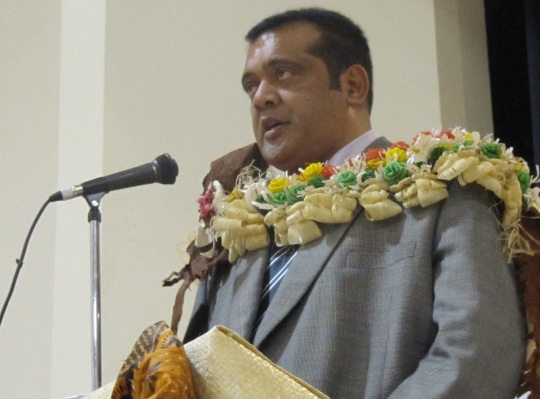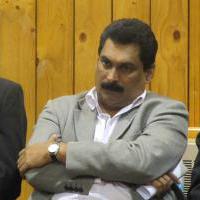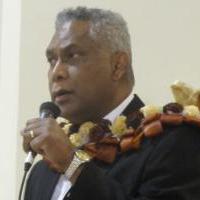
COMMENT: AUCKLAND (Pacific Media Watch): The Ratu Tevita Uluilakeba Mara road show rolled through Papatoetoe at the weekend with a meeting organised by the Fiji Freedom and Democracy Movement New Zealand.
A garlanding of the fugitive and former lieutenant-colonel and traditional yaqona ceremony preceded a long line up of speakers including the movement’s president Josaia Rasiga – a former assistant police commissioner of Fiji.
Rasiga had been arrested in 2007 and questioned over alleged corruption. He was later released and charges were withdrawn by the Fijian Independent Commission Against Corruption on a “logistics decision”.
Messages from former Fiji Prime Ministers Mahendra Chaudhry and Laisenia Qarase were read out and outspoken National Secretary of the Fiji Trades Union Congress Felix Anthony was present to talk about human rights abuses – including his own beatings – at the hands of the military.
Usual suspects
It was a denouncement of all things currently Fijian and a celebration of everything Fiji used to be. There was lament over the militarisation of the Methodist Church, but silence over it’s previous politicisation and overreaching power. There were tears for the demise of the Great Council of Chiefs, but nothing about the divisive and pro-indigenous Fijian policies it stood for.
Those present were not under any illusions that this was the old guard campaigning away in a wallowing exile.
Shailendra Raju, a former aid of Mahendra Chaudhry and chief of staff of the Fiji Labour Party, read out a message from the former Labour Prime Minister. He gave a lengthy presentation on the well-known economic woes of Fiji, often descending into a cynical anti-Bainimarama and Sayed-Khaiyum rant.
“It’s an undeniable fact that Khaiyum and Bainimarama have presided over the economic failure of Fiji,” he said.
“It’s a scorecard of misery, deceit and false promises.”
Slide after slide showing IMF figures and graphs compared the Bainimarama years to previous years of the Qarase and Chaudhry governments, with varied success in proving his point.
He said the sugar production had slumped to 139 tonnes; the industry was on the verge of collapse and that FJD$200 million was owed in loans. He said these problems were the result of the abuse of the rule of law and the separation of powers.
Violence against union
Trade union leader Felix Anthony gave an account of the realities faced by the labour movement.
“Just a few weeks ago I had my branch president at one of the mills bashed up stomped upon, kicked and abused at his workplace, simply because he was from the union and they demanded that he resign from the union. It is a concerted effort," Anthony said.
Anthony himself has felt the brunt of the regime’s dissatisfaction.
“I issued a statement that didn’t go down well with the regime and the Prime Minister and I was beaten up by the military on two occasions,” he said.
“I have had further threats, my family has had threats, but I need to keep a watch because they are not finished with me.”
He said he was doing what his job demanded of him which was to stand up for workers’ rights.
Former Land Force Commander Jone Baledrokadroka, who left Fiji shortly after the 2006 coup, spoke as the major proponent of the 10-point Transitional Plan for Democracy in Fiji.
Ratu Mara in the spotlight
When questions were asked of Ratu Mara, Baledrokadroka stepped up to the microphone. It further confirmed the impression that Ratu Mara is the celebrity "talent" behind the group, and is a prolific reader of prepared statements, but Baledrokadroka and others appear to be the real brains behind the movement.
The final question of the evening came from a Fijian member of the public – and was one Ratu Mara couldn’t avoid. Would he face justice if and when he returns to Fiji, for any involvement in military abuses?
The answer, given only in Fijian, was that he would.
Baledrokadroka is working on a PhD at the Australian National University in Canberra and he said the 10-point plan was the product of much consultation with Professor Brij Lal, and other academics, John Fraenkel and Stewart Firth.
The two main goals are to remove the Public Emergency Regulations and to remove the military from governing the country.
Baledrokadroka said it was a malleable plan and people shouldn’t be caught up in the detail. And there’s a reason for that. The academic influence has had its effect on what is a very theoretical set of goals without any practical ideas about how they could be brought about.
'Mandate' for change
When quizzed about how broad their mandate for change really is in Fiji, Baledrokadroka claimed a 95 percent support among the major parties.
“We have the Fiji Labour Party which is also very much an Indo-Fijian dominated party. It won the majority of votes as far as the Indo-Fijians are concerned in the last election.”
He also claimed the support of the National Federation Party, given that colleague Professor Brij Lal is a member of the party.
“These two parties are the major Indo-Fijian parties. Definitely we are still looking for more support across the political spectrum,” he said.
He said he was partly in New Zealand to look for Mick Beddoes to gain his support as well.
Beddoes is a previous leader of the opposition in Fiji and leader of the United People’s Party, which was the former United General Party – made up of ethnic minorities and those referred to as "general electors".
But Baledrokadroka’s answers betrayed a concession that even with his likely-overestimated support, there wasn’t much to be done in terms of real action within Fiji.
“We are a lobby group, all we can do is highlight the problems, call on various institutions and governments,” he said.
Support of Samoa
He said the movement was hoping to present to the Pacific Islands Forum in Auckland in September.
“We have backing by the Prime Minister of Samoa, who has given us a guarantee that he will be batting for our side, in our quarter when that day comes in September.”
But he also agreed they needed to gain more support of the Melanesian leaders.
“We are still trying to lobby the MSG, especially the Solomon Islands, and definitely when I go back to Canberra I’ll be making appointments with various leaders and even go and visit them in their country.”
Felix Anthony, who returns today to Fiji and is likely to face some unhappy military figures from the military due to his recent comments, could not see that there was any way to solve the problem until the military stepped out of running the country.
“It is not their role to be in government and to rule to country,” he said. “Their role is to defend the country and the people. We hope they will realise this and do the right thing.
“We don’t want any violence, we certainly don’t want any violence.”
The road show will move on, soon to the United States, and then to other Pacific countries. While Bainimarama will futilely send extradition papers to every country Ratu Mara might visit, the democracy groups will face an even more depressing futility.
Particularly if they expect that future Fiji will be a blueprint of their halcyon days currently reminisced on in exile.
RATU MARA WOOS NZ-BASED SUPPORT Ratu Tevita Mara has been on a five-day flag-waving tour of New Zealand for a return to "democracy" in Fiji. Pacific Media Watch contributing editor Alex Perrottet was on hand at the reformed coup soldier's Auckland meeting and reports on Mara's speech and backgrounds the event.



